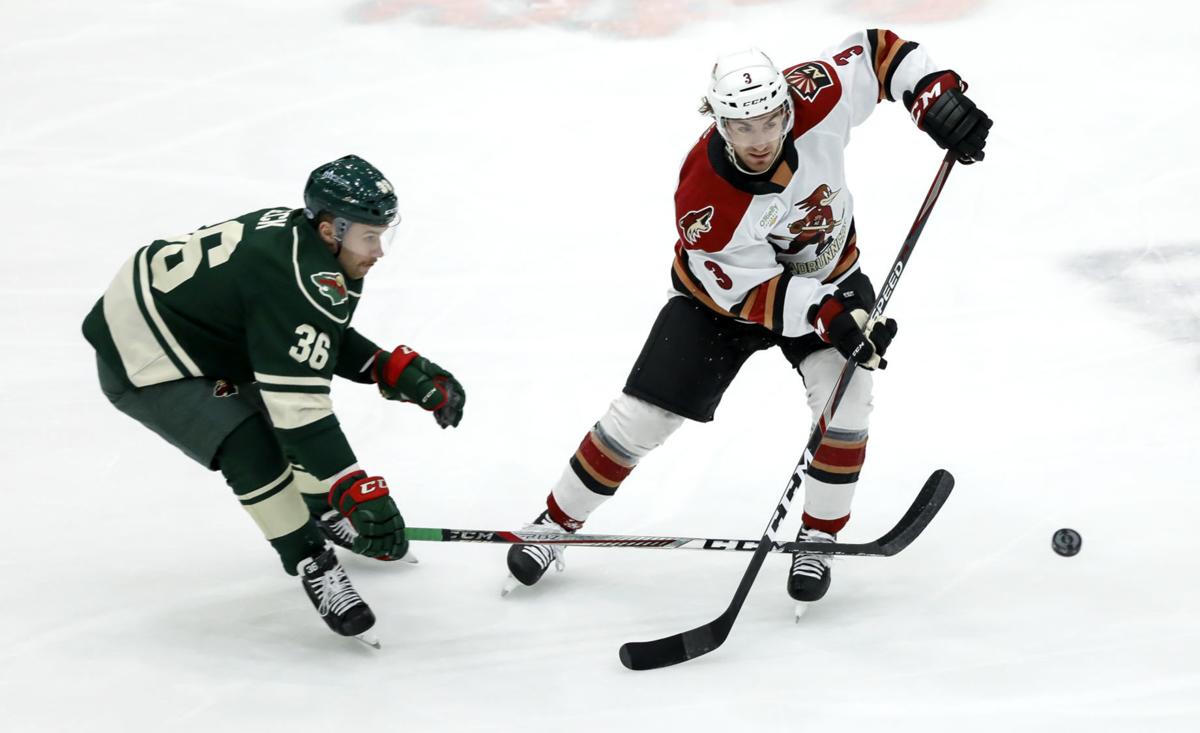Through the final buzzer of the Tucson Roadrunners’ 2-1 victory over the Colorado Eagles on Wednesday at Tucson Arena, roughly 8,700 penalty minutes had been served across the 31-city American Hockey League landscape with roughly one-third of the season gone by.
In all, 751 players – that includes those on active rosters as well as players who have since moved on to other leagues — had been called for, at minimum, some sort of penalty this season.
Tripping. Boarding. Hooking. Slashing. High-sticking. Interference. Fighting. Even embellishment (yes, that’s a no-no, too). It’s all in there.
Even 12 goaltenders have been whistled for at least one two-minute minor, and some more than once.
Jordan Gross, the Roadrunners’ second-year defenseman having a breakout year as the backbone of Tucson’s blueline effort, is, most definitively, not one of those players.
And it’s not a stretch to surmise that Gross has been the AHL’s least-penalized player this season, when taking into account how much ice time he accumulates.
Gross said the key to staying out of trouble is all in positioning.
“If you’re out of position, you might end up having to hook a guy to catch up with him. You don’t want that,” he said, adding that stick control is also crucial. “I think if you can try to eliminate being lazy with your stick, that’s a good way to stay out of the box.”
The league leader in penalty minutes, winger Stefan Noesen of the Wilkes-Barre/Scranton Penguins, had 58 heading into Friday night’s action. The Roadrunners’ most-penalized: forward Jeremy Gregoire, who’s fifth in the league with 50 penalty minutes.
But, as of Friday — with the first-place Roadrunners (17-5-0-0) preparing to open a four-game road trip Saturday at 6 p.m. in Des Moines against the Iowa Wild (12-7-2-2) — Gross and teammate Hudson Fasching were two of only 22 non-goalies to skate in 10 or more games for their respective AHL clubs this year without a single minute spent in the box. Both Gross and Fasching have played significant minutes in all 22 Tucson outings this season, and Gross is the only defensemen among that list of penalty-less AHL players. No other AHL defenseman has played in more than nine games this season without committing a foul.
“Most of my time playing, I’ve been a part of the penalty kill,” Gross said, noting that the best way to be a staple on that unit is to not be the one that causes the situation in the first place. “I’ve tried to stay out of the box as much as possible to be able to do that.”
Added Tucson coach Jay Varady of the sure-footed, steady-sticked Gross, who last season did card 28 penalty minutes in 67 game: “He’s able to play good defensive hockey without putting himself at risk.
“Not getting your stick trapped up in people’s skates, hugging guys, wrapping guys up — so it means he’s playing a good brand of defense,” Varady noted. “Being able to defend situations without taking a penalty is an important thing.”
Although it’s readily available at the NHL level, AHL clubs don’t publicly share time-on-ice data for players. But because of the way line pairings most often work, it’s common for those on the blueline to see more minutes of ice time than forwards.
That’s the basis for the conclusion that no skater has played more AHL minutes this season without being flagged than Gross.
Kyle Capobianco, a two-time AHL all-star himself who’s most recently been paired alongside Gross the last five games, reiterated that its Gross’ skating ability and steady stick work that make all the difference.
“You take bad penalties when you get caught with your feet. … He can skate with anyone, and doesn’t get stuck in bad spots,” Capobianco said, adding that Gross doesn’t get caught with his stick out of position, either — something that can lead to tripping calls. “He’s got such an efficient stick. He just knows how to get the puck away.”
Gross, who has four goals and 14 points this season, has clearly seen that offensive part of his game evolve, too.
“He makes such good plays on the bluelines that it opens up so many chances,” Capobianco said. “And he’s got an NHL-ready shot. He can pick our goalies apart. … He’s that good.”
Varady said that it’s important to remember Gross is only in his second year of pro hockey, after joining the Roadrunners following a four-year Division I college hockey career at Notre Dame.
“I think Jordan’s just developing as a pro,” Varady said. “It’s Year 2, it’s not like it’s Year 6 for him. So he’s understanding the pro game right now and he’s going to continue to grow even more as he develops.”





